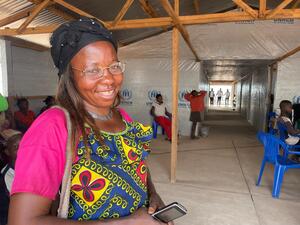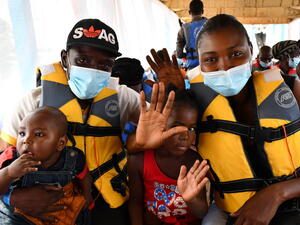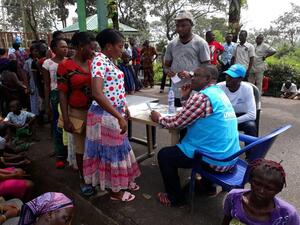Guterres marks end of Angolan repatriation; next challenge is Congolese in Angola
Guterres marks end of Angolan repatriation; next challenge is Congolese in Angola

Congolese refugee children in class at a settlement on the edge of the Angolan capital, Luanda. UNHCR hopes to find a solution for the Congolese refugees in Angola.
LUANDA, Angola, March 28 (UNHCR) - UN High Commissioner for Refugees António Guterres has underlined the next challenge UNHCR faces in Angola, celebrating the end of organised repatriation of Angolan refugees from abroad while discussing how to find a solution for Congolese refugees who have been in Angola for decades.
A day after marking the successful return of some 410,000 Angolan refugees to their homeland, Guterres on Wednesday visited the Vianna Refugee Camp, which houses some 7,000 Congolese refugees who have been in Angola since fleeing fighting in their homeland in the 1960s.
While repatriation was the "durable solution" for most of the half million Angolans who fled their country during three decades of war, the UN refugee agency believes permanent residency would be the best option for the long-staying Congolese refugees. Most were born in Angola, the children of the original refugees, and have indicated they do not want to go to the Democratic Republic of the Congo (DRC).
"When it comes to hosting refugees, the extreme generosity of African nations is impressive and should serve as an example for other nations to follow," Guterres said. He was due to leave Angola on Wednesday night.
Angola hosted a ceremony on Tuesday to mark the official close of the UNHCR-organised assisted repatriation programme. Spontaneous movement home started from the end of the Angolan civil war in 2002, when 457,000 Angolans were sheltering in neighbouring countries.
The following year, with continuing peace assured, UNHCR and governments in bordering states began organised returns. Most came from Zambia and the DRC, which sheltered the bulk of refugees. Smaller numbers came from Namibia, the Republic of Congo, Botswana and South Africa.
In the four years of repatriation, UNHCR organised the return of 138,594 Angolan refugees. The last of the 2006 repatriation groups arrived this month by chartered aircraft from the DRC. During that period, UNHCR also assisted 116,856 Angolan refugees who returned on their own. A further 154,000 Angolans are estimated to have returned home and reintegrated without UNHCR help.
"Contrary to what many people believe, the vast majority of refugees do not want to emigrate to a rich country, the majority want to go back home," Guterres said at the ceremony on ending organised repatriation, which was attended by representatives of the countries that had hosted Angolan refugees.
He noted that those Angolan refugees who had not accepted the UNHCR offer of repatriation assistance in the last four years could still return on their own. Prime Minister Fernando da Piedade Dias dos Santos said Angola would do everything to guarantee the sustainable reintegration of returnees, including providing jobs, schools and hospitals.
"This is a very important moment and this operation is particularly important, not only because of the number of persons repatriated and the countries involved, but also - and for me this is the most important fact - because the operation was carried out without any accidents or incidents," the prime minister told the meeting.
In recent years, UNHCR in Angola had been focused primarily on facilitating the reintegration of the returning Angolan refugees. While it undertook a number of community-based projects, the priority was to act as a catalyst to involve others - the government, other international bodies and non-governmental organisations - in much-needed development programmes.
"UN agencies have eventually - and with some difficulty - moved from the humanitarian phase to a development-oriented one," said Enrique Valles, the UNHCR officer responsible for Angolan reintegration. "However, the humanitarian situation in the areas of return of the country remains fragile."
As UNHCR's role in reintegration and repatriation ends, the office in Luanda is shifting toward protection concerns. In his audience with the Angolan Minister of the Interior, General Roberto Leal Ngongo, Guterres reiterated the need for Angola to assume the role of a country of asylum and offered to help Angolan authorities differentiate between refugees and economic migrants.
The immediate priority for UNHCR is to find a solution for the long-standing Congolese refugees in Angola. UNHCR is planning a registration of the refugees - in Vianna and elsewhere in Angola - later this year to provide detailed data on this group.
The Angolan government has indicated a willingness to resolve the situation but the lack of clear information has hindered any progress. They originally arrived during the separatist conflict in Katanga province, in what was then the country of Zaire, and have lived alongside Angolans ever since.
By Manuel Cristovao Simao in Luanda, Angola








